| Listing 1 - 10 of 31 | << page >> |
Sort by
|
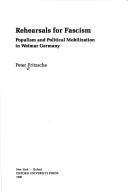
ISBN: 0195057805 Year: 1990 Publisher: New York Oxford University Press
Abstract | Keywords | Export | Availability | Bookmark
 Loading...
Loading...Choose an application
- Reference Manager
- EndNote
- RefWorks (Direct export to RefWorks)
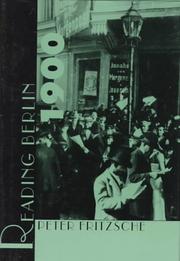
ISBN: 0674748816 0674748824 0674037367 9780674748811 Year: 1996 Publisher: Cambridge, MA : Harvard University Press,
Abstract | Keywords | Export | Availability | Bookmark
 Loading...
Loading...Choose an application
- Reference Manager
- EndNote
- RefWorks (Direct export to RefWorks)
In this study of the newspaper page, Fritzsche analyzes how reading & writing dramatized Imperial Berlin & anticipated the modernist sensibility that celebrated discontinuity, instability, & transience.
Berlijn in de pers --- Berlin (Germany) in the press --- Berlin dans la presse --- German newspapers --- History --- -Newspapers --- Berlin (Germany) --- -Press coverage --- History. --- -History --- Newspapers --- Press coverage. --- Germany --- Berlin (Germany) in the press. --- German newspapers - Germany - Berlin - History. --- German newspapers - History - Germany - Berlin
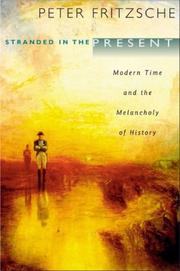
ISBN: 0674013395 Year: 2004 Publisher: Cambridge (Mass.) : Harvard University Press,
Abstract | Keywords | Export | Availability | Bookmark
 Loading...
Loading...Choose an application
- Reference Manager
- EndNote
- RefWorks (Direct export to RefWorks)
Historians --- Historiography --- Historiography. --- History --- Political and social views. --- Philosophy. --- France --- Europe --- History, Modern --- Historical criticism --- Authorship --- Historiographers --- Scholars --- Political and social views --- Philosophy --- Criticism
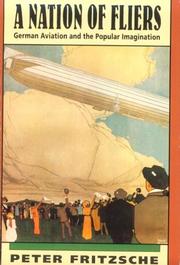
ISBN: 067460122X 9780674601222 9780674037380 0674037383 0674601211 9780674601215 Year: 1992 Publisher: Cambridge, MA : Harvard University Press,
Abstract | Keywords | Export | Availability | Bookmark
 Loading...
Loading...Choose an application
- Reference Manager
- EndNote
- RefWorks (Direct export to RefWorks)
Reviews of this book: "Peter Fritzsche's unusual and enthralling history is about the most pervasive of [Germany's] dreams, the national dream of an empire of the air." --Martin Pawley, The Guardian "An important, thought-provoking study." --Dissent "An excellent book, beautifully written.There is really nothing quite like it in the field.Its combination of solid scholarship, appealing writing, and provocative thought makes it an important contribution to our understanding of modern German military history." --Edward Homze, Air Power History "A fascinating tale that provides a refreshing perspective on the history of early twentieth-century Germany, and Peter Fritzsche has told it with flair, passion, and an array of evidence taken from a wide range of little-known sources." --Robert Wohl, German Politics and Society "A fundamental breakthrough in the development of an understanding of how technology fed a Faustian vision of modernism in which nationalism and industrial society became ever more compatible and ever more popular.A model in its insight into the correlation of technology and the popular imagination in the twentieth century." --Ronald Warloski, American Historical Review "Peter Fritzsche presents a remarkable blend of technological, social, and cultural history in his study of the popular German reaction to early aviation.His findings have sizable implications for all scholars of twentieth-century Germany." --Norman W. Goda, German Studies Review
Aeronautics --- Aerospace engineering --- History --- Aeronautical engineering --- Astronautics --- Engineering --- Aerostation --- Air navigation --- Aviation --- Communication and traffic --- Aerodynamics --- Airships --- Balloons --- Flight --- Flying-machines
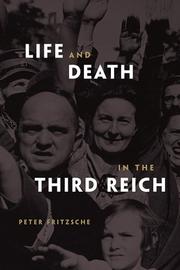
ISBN: 0674037375 0674033744 9780674033740 9780674037373 9780674027930 0674027930 0674034651 Year: 2008 Publisher: Cambridge, Mass. : Belknap Press of Harvard University Press,
Abstract | Keywords | Export | Availability | Bookmark
 Loading...
Loading...Choose an application
- Reference Manager
- EndNote
- RefWorks (Direct export to RefWorks)
Fritzsche deciphers the puzzle of Nazism's ideological grip. Its basic appeal lay in the Volksgemeinschaft - a "people’s community" that appealed to Germans to be part of a great project to redress the wrongs of the Versailles treaty, make the country strong and vital, and rid the body politic of unhealthy elements. Diaries and letters reveal Germans' fears, desires, and reservations, while showing how Nazi concepts saturated everyday life.
National socialism. --- Holocaust, Jewish (1939-1945) --- Collective memory --- Catastrophe, Jewish (1939-1945) --- Destruction of the Jews (1939-1945) --- Extermination, Jewish (1939-1945) --- Holocaust, Nazi --- Ḥurban (1939-1945) --- Ḥurbn (1939-1945) --- Jewish Catastrophe (1939-1945) --- Jewish Holocaust (1939-1945) --- Jews --- Nazi Holocaust --- Nazi persecution of Jews --- Shoʾah (1939-1945) --- Genocide --- World War, 1939-1945 --- Kindertransports (Rescue operations) --- Nazism --- Authoritarianism --- Fascism --- Nazis --- Neo-Nazism --- Totalitarianism --- Causes. --- Nazi persecution --- Persecutions --- Atrocities --- Jewish resistance --- Causes --- Germany --- Alemania --- Ashkenaz --- BRD --- Bu̇gd Naĭramdakh German Uls --- Bundesrepublik Deutschland --- Deutsches Reich --- Deutschland --- Doitsu --- Doitsu Renpō Kyōwakoku --- Federal Republic of Germany --- Federalʹna Respublika Nimechchyny --- FRN --- German Uls --- Germania --- Germanii︠a︡ --- Germanyah --- Gjermani --- Grossdeutsches Reich --- Jirmānīya --- KhBNGU --- Kholboony Bu̇gd Naĭramdakh German Uls --- Nimechchyna --- Repoblika Federalin'i Alemana --- República de Alemania --- República Federal de Alemania --- Republika Federal Alemmana --- Vācijā --- Veĭmarskai︠a︡ Respublika --- Weimar Republic --- Weimarer Republik --- ХБНГУ --- Германия --- جرمانيا --- ドイツ --- ドイツ連邦共和国 --- ドイツ レンポウ キョウワコク --- Germany (East) --- Germany (Territory under Allied occupation, 1945-1955) --- Germany (Territory under Allied occupation, 1945-1955 : British Zone) --- Germany (Territory under Allied occupation, 1945-1955 : French Zone) --- Germany (Territory under Allied occupation, 1945-1955 : Russian Zone) --- Germany (Territory under Allied occupation, 1945-1955 : U.S. Zone) --- Germany (West) --- Holy Roman Empire --- Third Reich, 1933-1945 --- History --- Ethnic relations --- Nazisme --- Holocauste, 1939-1945 --- Mémoire collective --- Allemagne --- Histoire --- Relations interethniques --- Deguo --- 德国 --- Gėrman --- Герман Улс --- Holocaust, Nazi (Jewish Holocaust) --- Nazi Holocaust (Jewish Holocaust) --- Nazi persecution (1939-1945)
Book
ISBN: 0674060954 9780674060951 9780674055315 0674055314 Year: 2011 Publisher: Cambridge, Mass. : Harvard University Press,
Abstract | Keywords | Export | Availability | Bookmark
 Loading...
Loading...Choose an application
- Reference Manager
- EndNote
- RefWorks (Direct export to RefWorks)
Franz Göll was a thoroughly typical Berliner. He worked as a clerk, sometimes as a postal employee, night watchman, or publisher's assistant. He enjoyed the movies, ate spice cake, wore a fedora, tamed sparrows, and drank beer or schnapps. He lived his entire life in a two-room apartment in Rote Insel, Berlin's famous working-class district. What makes Franz Göll different is that he left behind one of the most comprehensive diaries available from the maelstrom of twentieth-century German life. Deftly weaving in Göll's voice from his diary entries, Fritzsche narrates the quest of an ordinary citizen to make sense of a violent and bewildering century.Peter Fritzsche paints a deeply affecting portrait of a self-educated man seized by an untamable impulse to record, who stayed put for nearly seventy years as history thundered around him. Determined to compose a "symphony" from the music of everyday life, Göll wrote of hungry winters during World War I, the bombing of Berlin, the rape of his neighbors by Russian soldiers in World War II, and the flexing of U.S. superpower during the Reagan years. In his early entries, Göll grappled with the intellectual shockwaves cast by Darwin, Freud, and Einstein, and later he struggled to engage with the strange lifestyles that marked Germany's transition to a fluid, dynamic, unmistakably modern society.With expert analysis, Fritzsche shows how one man's thoughts and desires can give poignant shape to the collective experience of twentieth-century life, registering its manifold shocks and rendering them legible.
Men --- German diaries --- Human males --- Human beings --- Males --- Effeminacy --- Masculinity --- German literature --- History and criticism. --- Göll, Franz, --- Von Göll, Franz, --- Berlin (Germany) --- Germany --- Stadt Berlin (Germany) --- Berlin (Germany : State) --- Berlim (Germany) --- Baralīna (Germany) --- Berolinum (Germany) --- Berlinum (Germany) --- Verolino (Germany) --- Land Berlin (Germany) --- Berlin State (Germany) --- Berlino (Germany) --- Berlijn (Germany) --- Berlin (Germany : West) --- Berlin (Germany : East) --- Alemania --- Ashkenaz --- BRD --- Bu̇gd Naĭramdakh German Uls --- Bundesrepublik Deutschland --- Deutsches Reich --- Deutschland --- Doitsu --- Doitsu Renpō Kyōwakoku --- Federal Republic of Germany --- Federalʹna Respublika Nimechchyny --- FRN --- German Uls --- Germania --- Germanii︠a︡ --- Germanyah --- Gjermani --- Grossdeutsches Reich --- Jirmānīya --- KhBNGU --- Kholboony Bu̇gd Naĭramdakh German Uls --- Nimechchyna --- Repoblika Federalin'i Alemana --- República de Alemania --- República Federal de Alemania --- Republika Federal Alemmana --- Vācijā --- Veĭmarskai︠a︡ Respublika --- Weimar Republic --- Weimarer Republik --- ХБНГУ --- Германия --- جرمانيا --- ドイツ --- ドイツ連邦共和国 --- ドイツ レンポウ キョウワコク --- Germany (East) --- Germany (Territory under Allied occupation, 1945-1955) --- Germany (Territory under Allied occupation, 1945-1955 : British Zone) --- Germany (Territory under Allied occupation, 1945-1955 : French Zone) --- Germany (Territory under Allied occupation, 1945-1955 : Russian Zone) --- Germany (Territory under Allied occupation, 1945-1955 : U.S. Zone) --- Germany (West) --- Holy Roman Empire --- History --- Social conditions --- Politics and government --- Intellectual life --- Deguo --- 德国 --- Gėrman --- Герман Улс
Book
ISBN: 9780674037366 0674037367 Year: 2022 Publisher: Cambridge, MA
Abstract | Keywords | Export | Availability | Bookmark
 Loading...
Loading...Choose an application
- Reference Manager
- EndNote
- RefWorks (Direct export to RefWorks)
Book
ISBN: 9780465057740 Year: 2016 Publisher: New York Basic Books
Abstract | Keywords | Export | Availability | Bookmark
 Loading...
Loading...Choose an application
- Reference Manager
- EndNote
- RefWorks (Direct export to RefWorks)
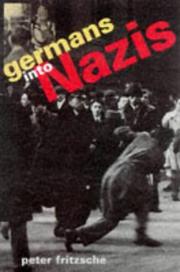
ISBN: 067435091X Year: 1998 Publisher: Cambridge, Mass. London Harvard University Press
Abstract | Keywords | Export | Availability | Bookmark
 Loading...
Loading...Choose an application
- Reference Manager
- EndNote
- RefWorks (Direct export to RefWorks)

ISBN: 9780674033740 0674033744 0674037375 9780674037373 9780674027930 0674027930 Year: 2008 Publisher: Cambridge, MA : Belknap Press of Harvard University Press,
Abstract | Keywords | Export | Availability | Bookmark
 Loading...
Loading...Choose an application
- Reference Manager
- EndNote
- RefWorks (Direct export to RefWorks)
Fritzsche deciphers the puzzle of Nazism's ideological grip. Its basic appeal lay in the Volksgemeinschaft - a "people’s community" that appealed to Germans to be part of a great project to redress the wrongs of the Versailles treaty, make the country strong and vital, and rid the body politic of unhealthy elements. Diaries and letters reveal Germans' fears, desires, and reservations, while showing how Nazi concepts saturated everyday life.
History --- National socialism. --- Holocaust, Jewish (1939-1945) --- Collective memory --- Causes. --- Germany --- Ethnic relations
| Listing 1 - 10 of 31 | << page >> |
Sort by
|

 Search
Search Feedback
Feedback About UniCat
About UniCat  Help
Help News
News